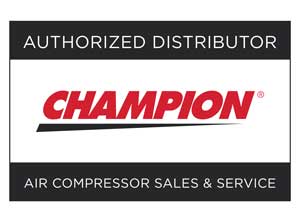What's your Compressor's Electrical Energy Cost?
Do you have access to the most used, most needed and most valuable Compressed Air Formulas? Find steps for air compressor electrical energy and CFM calculations below.
How to figure the ELECTRICAL ENGERY COST of running your Air Compressor
Use this formula for electrical energy calculation:
Electrical cost = Total HP x .746 x hours x KWH cost ÷ motor efficiency
Example:
25 HP air compressor that runs 10 hours a day 5 days a week for a year with a $.12 KWH electric rate and a 90% efficient electric motor.
To figure your total horsepower (TOTAL HP):
Motor Data Plate HP (EX: 25HP) X 110% = 27.5 HP
Most Air Compressors @ Max PSI Use 110% of the rated Horsepower
KILOWATTS per HP = .746 watts
746 watts per hour of electrical energy is required to convert to 1 Horsepower of mechanical energy. KWH= your cost per 1000 watts of electrical energy per hour.
Figure your YEARLY HOURS:
# Hours running per day X # days per week X # weeks per year running = The total time the equipment runs in a year.
(Example: 10 Per Day X 5 Days Wk X 52 Wks = 2600 HOURS)
MOTOR EFFICIENCY (EFF) can be found on the motor data plate as a percentage. (Example=.90 %) It is the ratio of input power minus the output power.
27.5 hp x .746 x 2600 hours x $.12 ÷ .90 = $7111.87 per year
Results:
ANNUAL ELECTRIAL COST FOR COMPRESSED AIR $7111.87
Valuable Compressed Air Formulas
Follow these steps to find out how many CFM Your Air Compressor actually delivers
1. STOP the Champion compressor unit
2. CLOSE the outlet valve on the tank/air receiver
3. DRAIN the condensate from air receiver until there is 0 PSIG -then close the drain valve
4. NOTE THE TIME- in minutes & seconds (Best to write it down.) Then START THE UNIT.
When the compressor unit stops and unloads – then NOTE THE TIME again – in minutes & seconds. Convert the minutes into seconds and then total the number of seconds it takes between START and STOP/UNLOAD.
5. NOTE the GUAGE PSIG reading
6. NOTE the Air Receiver/Tank GALLON SIZE
7. USE THIS FORMULA for air compressor CFM calculation:
TANK GALLONS x .538* x PSIG divided by SECONDS
EXAMPLE:
You have an 80 gallon tank, your total start to stop/unload time was 3 minutes and 9 seconds.
Change the minutes to seconds timed (60 x 3= 180 seconds plus 9 seconds totals 189). You will use the total number of seconds189 and the noted 175 PSIG within the formula as shown below:
80 multiplied by .536 = 42.88
42.88 multiplied by 175 (example PSIG) = 7504.00
7504.00 divided by 189 (total seconds)= 39.71 CFM delivered
You now know that your air compressor is delivering 39.71 CFM
Your Response to this evaluation should be to compare this number with what your air compressor manufacturer says your CFM should be and evaluate how efficiently your compressor is running.
Compressor Terms you should know:
Cubic Feet Per Minute (cfm) - Volumetric air flow rate.
"psig" means pounds per square inch, GAGE pressure. Gage pressure is the absolute pressure of something, with the atmospheric pressure subtracted. In practice, when someone gives a pressure in just "psi" they probably mean gage pressure. If they mean absolute, they should be using "psia."
Gauge Pressure - The pressure determined by most instruments and gauges, usually expressed in psig. Barometric pressure must be considered to obtain true or absolute pressure
Load Time - Time period from when a compressor loads until it unloads.
Unload - (No load) Compressor operation in which no air is delivered due to the intake being closed or modified not to allow inlet air to be trapped.
Receiver - A vessel or tank used for storage of gas under pressure. In a large compressed air system there may be primary and secondary receivers.
Demand - Flow of air at specific conditions required at a point or by the overall facility.

